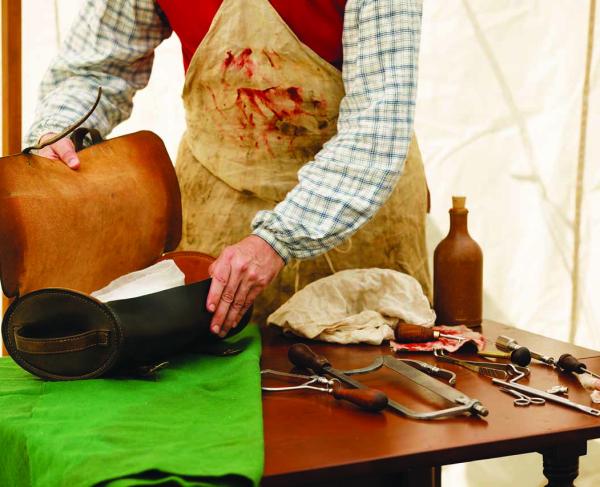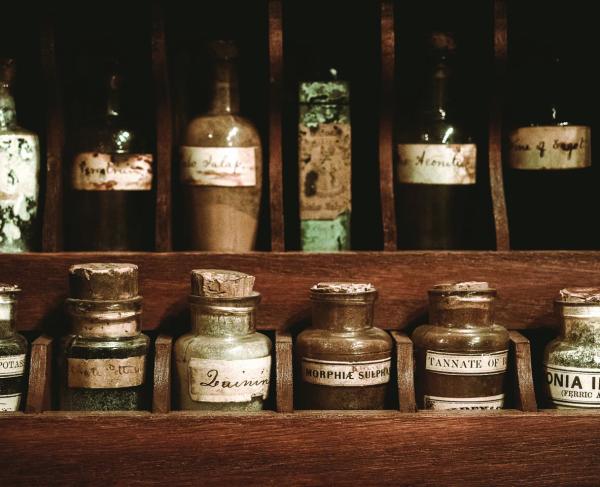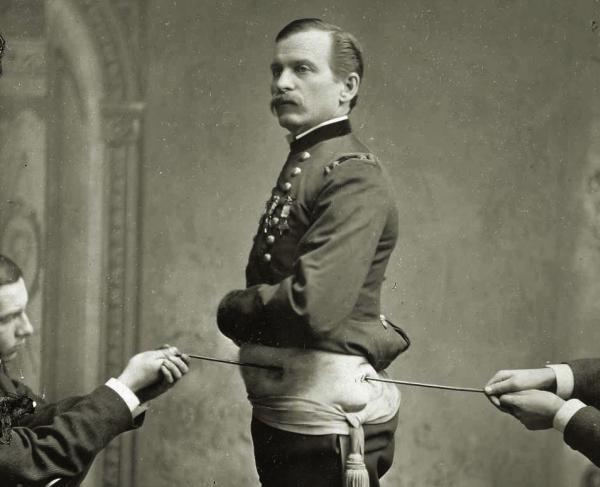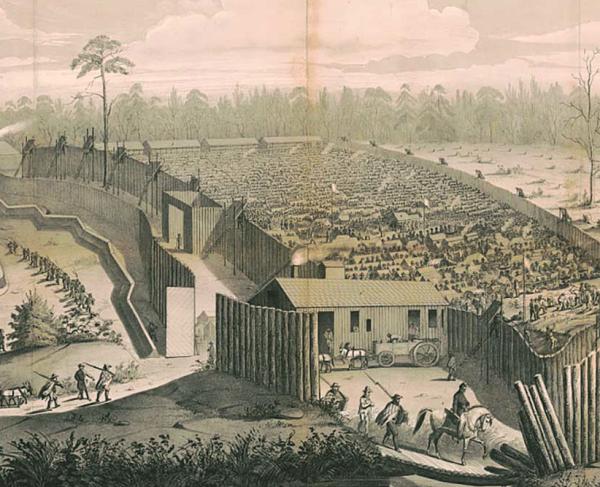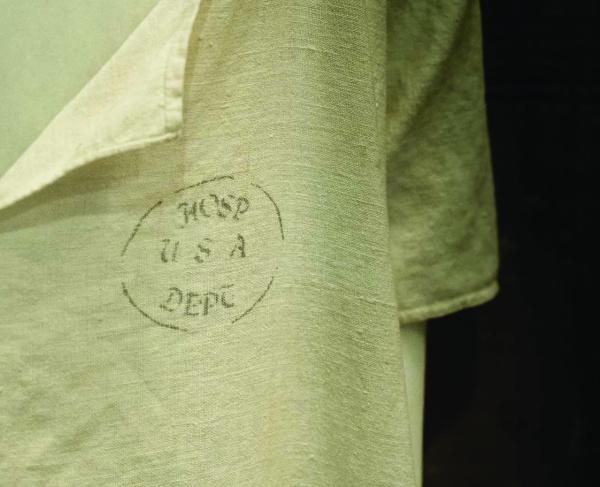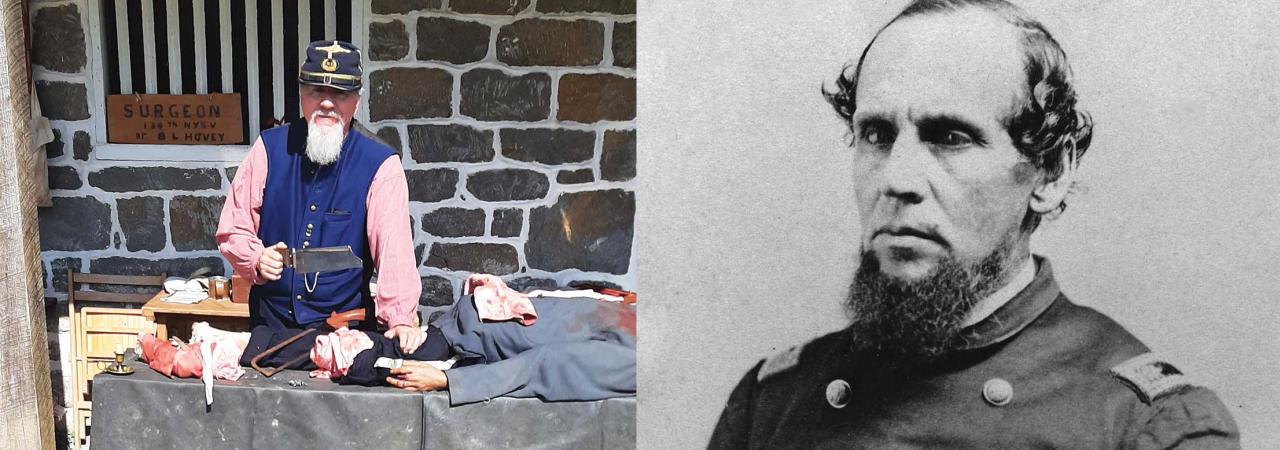
Rex Hovey at Gettysburg's Spangler Farm (left) and Dr. Bleeker Lansing Hovey (right)
Ancestry and Fold3 have been helping people understand their ancestors and why they fought for causes large and small for decades. Now, Ancestry and Fold3 have joined forces with the American Battlefield Trust, so that you can find the veterans in your family's past and understand their stories and the impact on the generations that followed. You can learn more at https: www.fold3.com/projectregiment.
In addition to this recurring Hallowed Ground column, this partnership has resulted in an exclusive discount for Trust members to subscribe to Ancestry and Fold3! Check your email for this exclusive offer.
I
magine the world through an ancestor’s eyes can be a daunting task, especially scenes of tragedy and loss. But Rex Hovey — a longtime Trust member — is accustomed to stepping into his great-granduncle’s shoes as he reenacts the work of a Civil War surgeon at places like the Spangler Farm at Gettysburg, where his ancestor stood and operated.
With no guidance from family stories, Rex came to learn about his ancestors through his own determined efforts utilizing Ancestry.com, museum and library archives, books, descendants’ organizations and more. Looking into his patriarchal line, he found Dr. Bleecker Lansing Hovey three generations back. Originally believing Dr. Hovey to be his great-grandfather, the resources on Ancestry.com informed Rex that the good doctor was actually his great-granduncle.
Dr. Hovey (born 1817) graduated from Geneva Medical School, now part of Syracuse University, in 1843, and began to practice in Dansville, New York, in that same year. He developed a special interest in the study of diseases, which ultimately served him well when the United States erupted into civil war.
Dr. Hovey mustered into the 136th New York Volunteer Infantry in 1862 in Portage, New York, with nearly 20 years experience as a physician prior to his service as a surgeon in the war. Present for many of the engagements in which the Army of the Potomac served, Dr. Hovey was on the scene operating during and after the Battles of Fredericksburg, Chancellorsville, Gettysburg, Chickamauga and Chattanooga. However, being in his mid-forties, he dealt with minor ailments — suspected to be arthritis — and he applied for a less transient position (assistant surgeon) with the U.S. Volunteers. But doing so required a thorough exam that questioned Dr. Hovey on his hypothetical treatment of various conditions. Lucky for his descendants, notably Rex Hovey, the doctor’s lengthy answers to this exam were stored away in the National Archives. Having passed the exam, Dr. Hovey resigned from the N.Y. Volunteers and went to work for the U.S. Volunteers in a Nashville hospital, in September 1864. His work continued for a few months after the war’s end, but he mustered out by August 1865. Afterward, he and his family settled in Rochester, New York.
But, for Dr. Hovey, the end of the Civil War didn’t mean a reunion with his wife and son – because they had already traveled with him throughout the war. His wife, Marilla, worked as a nurse, tending to war-wounded throughout field hospitals and camps, and writing to loved ones of the dead or dying. She briefly traveled without her husband when, in 1864, she was recruited to set up diet kitchens — that provided higher-quality meals to patients with special conditions — in large hospitals throughout the South. For her service, Marilla was granted a small pension after obtaining more than 75 letters from doctors and generals attesting to her good work — Rex has copies of many of these letters thanks to a friend in the 136th New York descendants’ organization. Meanwhile, Dr. Hovey’s teenaged son, Frank, at one point acted as assistant hospital steward — earning himself a certificate of honor for valuable service rendered.
Dr. Hovey spent the remainder of his life dedicated to medicine, and its ongoing improvement. He belonged to a long list of local and State medical societies, as well as the National Medical Society. Welcomed by his alma mater — Geneva College, which had merged to become Syracuse University — Dr. Hovey delivered an address to Syracuse University’s College of Medicine Alumni Association in June 1878; he praised vast study, fair examination and practice above quackery and shortcuts.
Today, Rex Hovey pays homage to his ancestor through living history. He even, through great luck and determination, located a Civil War-era surgeon’s kit belonging to Dr. Hovey — which he brings along to share with curious audiences as he shares the wartime tales of his great-granduncle and his family.
